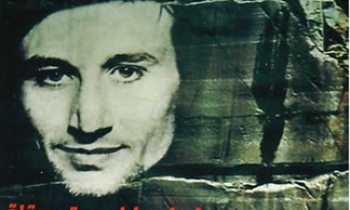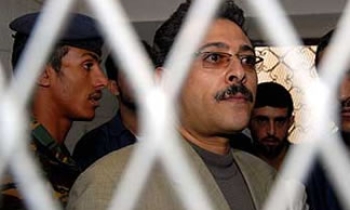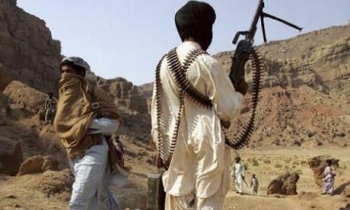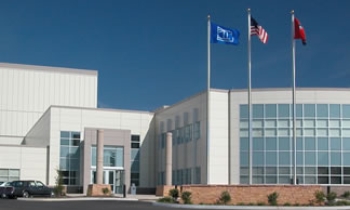During the struggle against Saddam Hussein's regime, Kurdish peshmerga fighters sought refuge in the mountains surrounding the northern Iraqi cities of Erbil and Sulaymaniyah. From here the peshmerga launched raids against Iraqi forces. Often accompanying them were the guerilla propagandists of the dominant Kurdish political parties, the Kurdistan Democratic Party, or K.D.P., and the Patriotic Union of Kurdistan, or P.U.K.
Plying the countryside with crude newsletters, the propagandists, or "mountain journalists," were a decisive force in rallying Kurds to the insurgent parties. "The Kurdish people at that time was confronting a giant tyrant," says former mountain journalist Dilshad Mustafa, now editor-in-chief of Khabat, a K.D.P.-funded newspaper in Erbil. The journalists' goal, Mustafa says, was "to instigate [the Kurdish people] to do their national duty" – to join them in the mountains resisting the government.
A decade after the Kurds won their fight for autonomy, mountain journalism is no more. The guerillas are now family men with nine-to-five jobs in Kurdistan's burgeoning economy. Their officers are politicians. And the mountain journalists have become the editors and reporters of the region's expanding media.
For many of these former propagandists, the transition to true journalism has been a hard one. Nor has the governing K.D.P.-P.U.K. alliance been eager to surrender its propaganda machinery in the interest of free media. Despite Kurdistan's steady march towards democracy, its media largely remains a function of its government – and anything but democratic.
Still, today's "city journalism" is vastly different from mountain journalism, Mustafa says. "The newspapers issued in the mountains were not reaching the hands of big numbers of people."
Now there are dozens of Iraqi Kurdish newspapers, the largest with a daily circulation of 7,000 – not bad for a region of just five million where many people are illiterate. Considering the diversity of regional satellite TV news programs and news radio and the large number of Kurdish magazines – not to mention the affiliated Web sites of all these media in a country where internet usage is exploding – Kurdistan is awash in news.
Despite the demand for news, there is only one private newspaper in the region: Hawlati, based in Sulaymaniyah with offices in Erbil. All other media in Kurdistan is funded by the political parties, which these days are synonymous with the Kurdistan Regional Government, or K.R.G.
The government's control is hard to overstate. Education and health care are free. Many Kurds, including widows and veterans, subsist entirely on government handouts. But big brother exacts a toll. Police, peshmerga and Kurdish Iraqi Army units, all of which answer to the government, maintain a constant presence on the streets and man checkpoints on every major road. There are Kurdish government minders on the staffs of every public institution, from hospitals to schools. The biggest publisher in Kurdistan is the Ministry of Culture, which by way of an antiquated press prints volumes of fiction, nonfiction and poetry and dozens of magazine titles. With the exception of Hawlati, all newspapers are funded by the government and charge only a nominal price. But they too answer to the parties.
Which seems to contradict the government's official policy on press freedom.
"We have no censorship," says Sami Shorish, Kurdistan's minister of culture. "Freedom to us is a very precious value because we have been oppressed for hundreds of years. We provide freedom to the media provided the media does not act in a slanderous way."
The problem is that "slander" is so vaguely defined that it could mean almost anything. It's an open-ended prohibition, and in a country with no Miranda rights and little sense of due process, that can be a very dangerous thing for journalists.
Karwan Abdula, a former Communist and editor of the Kurdish government-funded Caravan literary magazine says that slander could include specific criticism of party officials. "We publish articles critical of political thought, sometimes critical of the K.R.G. itself," he says. "But we're not naming names. We do not allow slanderous articles in the magazine."
Hawlati editors say the slander law was responsible for three of its reporters being jailed recently for covering controversial stories. One was arrested for criticizing Kurdish government officials over privacy laws after a racy bootleg DVD of some local girls dancing surfaced at Sulaymaniyah markets. Another was nabbed while investigating a medical warehouse fire, also in Sulaymaniyah, that some claim was deliberately set to cover the tracks of a Kurdish government minister who'd been stealing supplies to sell on the black market. A third Hawlati journalist was arrested in Dohuk while reporting on a story even Hawlati's editors won't talk about on the record. All three jailed reporters are out on bail awaiting trial.
The day-to-day consequences of working for Kurdistan's only independent newspaper aren't always so dramatic. The most frustrating is that most officials – from the lowliest cop to ministers and members of the regional assembly – refuse to talk to any media not affiliated with the government.
"We are not dealt with equally," says Talib Mohammed, a Hawlati reporter.
Najat Ahmed, the most senior Hawlati editor in Erbil, says the government is waging a campaign to undermine the newspaper.
"Both the P.U.K. and the K.D.P. are trying hard to penetrate the Hawlati staff and lure, even bribe, our staff to stop working for the newspaper," says Faisal Khalil, also a Hawlati editor in Erbil. "We have a number of staff who have quit. They even took the [office] tea-maker with them."
What's more, Ahmed and Khalil say that they promptly fire any staffers they suspect might be bending under the government's assault. Ahmed says he has seen the staff turn over completely three times in only a few years. As a result of external pressure and internal vigilance, the atmosphere at Hawlati is the same you'd expect at a besieged fortress.
Even the oppressive work environment won't deter him, Mohammed says. "In the very beginning I came to the realization that government newspapers cannot cover many of society's problems." That, he adds, is why he fights.
Kurdish government-funded newspapers justify their cozy relationships saying that's the only way to do business in Kurdistan. Besides, Mustafa says, Hawlati has "many articles that are critical of the K.R.G."
"We have a page called the open page where writers can shoot their own ideas. It is not commanded that all writers should reflect the ideas of the K.D.P.," he says.
But the prohibition of slander stands and no criticism of the government can be too specific. Naming names is a no-no.
Shorish says that too much press freedom would jeopardize Kurdistan's security by undermining the government. "You have to take into consideration that currently the Middle East is a cradle of terrorism. We give freedom to media but not to terrorists."
Asked if the security climate encourages self-censorship, Shorish says no. "I haven't felt it in an excessive way. I've felt it with Arabs, but not with Kurds."
For some, the government's stranglehold on the regional press has unsettling historical precedents.
Sharzad Farman Jacob, a Christian Kurd and former freedom fighter who spent ten years imprisoned at Abu Ghraib back when it was one of Hussein's torture pits, recalls that even in prison, the Baath regime had a coordinated propaganda machine. The only books allowed inside prison walls were from Baathist publishers. The only newspapers prisoners could get their hands on were state-owned. Every time that Hussein addressed the nation on TV, all the prisoners were ushered into halls and made to watch, sometimes for hours at a time. When Jacob was freed in 1995, he vowed that he would fight for a Kurdish government that did things differently than the Baathists did. "I'd like everybody to work opposite to how the Baath party was working here."
Kurdish government officials stress that press freedom is important to Kurdistan's development. But few seem to understand that money means control, and in Kurdish media, the government controls all the money.
"[A lack of] education is the greatest obstacle to true democracy in Kurdistan," Mufti says, coming as close as any Kurdish government big wig to admitting that the region needs a freer press.
Confesses Shorish, "It's not easy to have this experiment of having a free media."









